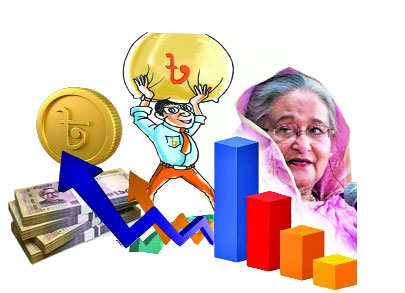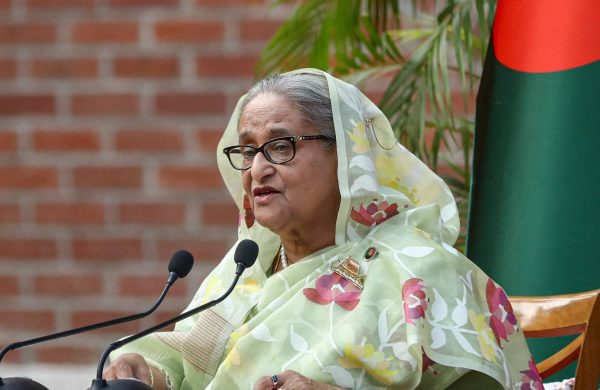Country’s debt rises to Tk14.20 lakh cr under Hasina regime
- Update Time : Thursday, August 29, 2024

TDS Desk:
The government’s domestic and foreign debt has increased by Tk14,20,585 crore during Sheikh Hasina’s tenure as a prime minister, according to a Quarterly Debt Bulletin released by the finance ministry yesterday.
According to the bulletin, on 6 January 2009, when the Awami League government, led by Sheikh Hasina, took office, the domestic and foreign debt stood at Tk2,76,830 crore. The amount rose to Tk16,97,415 crore by 31 March this year.
The loan status for the period from April to 5 August, the day Sheikh Hasina resigned, has yet to be disclosed officially. Finance officials said that the government borrowed more from banks than usual during this period.
While the government was supposed to borrow a maximum of Tk16,000 crore per month from the Bangladesh Bank through Ways and Means and Overdraft, it borrowed a total of Tk48,000 crore in June and July – Tk24,000 crore each month.
The extra Tk16,000 crore loan for those two months was initially taken with verbal approval from then-finance minister Abul Hassan Mahmood Ali, and later received retrospective authorisation from the current Finance Adviser Dr Salehuddin Ahmed.
Officials told that the government took on extra debt in June due to bill payments and in July due to the student uprising, as revenue collection was low. So, the total loan amount up to Sheikh Hasina’s resignation is expected to increase.
The government’s bank borrowing has increased rapidly since 2022. As of December 2017, domestic debt stood at Tk3,20,272 crore. Ahead of the 2018 elections, the debt amount surged to accelerate the completion of various mega projects.
Simultaneously, the national budget size was increased by boosting government expenditure, but this was financed mainly through borrowing from domestic sources rather than increasing revenue collection.
According to the finance ministry, the country’s total debt-to-GDP ratio is 33.78%. Of the total debt, high-interest domestic loans amounts to Tk9,82,743 crore, while low-interest foreign debt stands at Tk7,14,672 crore.
Interest rates on domestic loans are significantly higher than on foreign loans, and as the government’s domestic debt rises, interest costs also increase.
The current fiscal year’s budget allocates Tk1,12,655 crore for interest payments, with Tk96,000 crore for domestic debt and Tk20,500 crore for foreign debt.
An analysis of the debt data reveals that domestic and foreign debt as of 30 June 2021 was Tk11,44,296 crore. This means that over a period of two years and nine months, debt increased by Tk5,53,119 crore.
During this period, the government’s borrowing from the banking sector grew by approximately 169%. As of 30 June 2021, the borrowing from banks was Tk3,34,252 crore, which rose to Tk5,61,171 crore by 31 March 2024.
Additionally, borrowings through Treasury Bills nearly tripled, while borrowings from Treasury Bonds and Special Purpose Treasury Bonds increased by more than 50%, and borrowings through Sukuk (Shariah-compliant bonds) more than doubled.
However, borrowing from saving certificates bonds remained unchanged.
As of 31 March, government borrowings included Tk1,32,864 crore through Treasury Bills, Tk4,10,307 crore from Treasury Bonds and Special Purpose Treasury Bonds, Tk18,000 crore from Sukuk, Tk3,52,688 crore from savings certificates, and Tk68,884 crore from other sources, including General Provident Fund (GPF).
To cover subsidies for fertiliser and electricity, the government issued Special Purpose Treasury Bonds.
As of March this year, the government issued Tk10,598 crore in bonds for subsidies to Independent Power Producers (IPPs) and Tk9,753 crore for fertiliser imports, according to the finance division.
These bonds were issued to creditor banks against the loans of IPPs and fertilizer importers, with banks receiving interest at the repo rate, which currently stands at 9%. This has further increased the government’s debt.
As a condition for the release of the third tranche of the $4.7 billion loan to Bangladesh, the International Monetary Fund (IMF) said the government cannot meet subsidy obligations through such bond issuance.
‘CURRENT DEBT SITUATION IS PUTTING PRESSURE ON THE ECONOMY’
Towfiqul Islam Khan, a senior research fellow at the Centre for Policy Dialogue, told that, “Over the past 15 years, the economy has expanded, the budget has grown, inflation has risen, and the value of the rupee has depreciated against the dollar. As a result, an increase in debt is normal.”
However, what needs to be assessed is whether the borrowed funds are sustainable and if the country has the financial capacity to repay the debt, he said.
“A major indicator of a country’s ability to repay debt is its tax revenue collection and whether it has sufficient foreign exchange reserves since foreign debt must be repaid in foreign currency,” he said.
The current debt situation is putting pressure on the economy. A thorough analysis of the debt situation is essential for a new Bangladesh, especially given the uncertainties surrounding the actual size of GDP, Towfiqul said.
A commission has been formed to publish a white paper on the country’s economic situation. Hopefully, it will provide a clearer picture of the debt situation, he added.













